Ultimate 7-Day Florida National Parks Itinerary
Visit Key Biscayne, Everglades & Dry Tortugas National Parks with this 7-day Florida National Parks itinerary!

As winter nears, many of us are preparing to bundle up for the cold and getting our winter ski and snowboard gear ready for the season. But warmer destinations like Florida are just about to hit their prime and a Florida National Parks itinerary is a great option for outdoor adventurers not quite ready to embrace the winter weather.
Not many people are aware that Florida boasts three National Parks. Most visitors are just familiar with the Everglades, but Florida is also home to Dry Tortugas National Park and Key Biscayne National Park. Having visited 28 US National Parks, I would argue that these parks are among the best for viewing wildlife such as alligators, crocodiles, turtles, birds, and even Burmese pythons.
Why not check out all that southern Florida has to offer (other than Disney World) and jet away for a little fun with this ultimate Florida National Parks road trip.
Discover the best of Florida outdoor adventure with this 7-day Florida National Parks itinerary
#1 campsite finder app
Try The Dyrt PRO free for 30 days
Get a FREE 30-Day membership to The Dyrt PRO, one of our favorite apps for finding campsites.
Perks include:
• 5,000+ free camping locations
• 1,000+ campground discount network
• $0 extra booking fees
• Get reservations at sold-out campgrounds, and more
Use the code BEARFOOT to get 30 days free!
This post may contain affiliate links.
Where to start your Florida National Parks Road Trip
All three of Florida’s National Parks are located in the southern portion of the state. Ft. Lauderdale is generally cheaper to fly into than Miami, but Miami has lots to offer and is a great hub for starting trips to the Everglades and Key Biscayne National Parks. If you can swing it, I highly recommend starting in Miami and spending a day or two checking out some of its cultural spots.
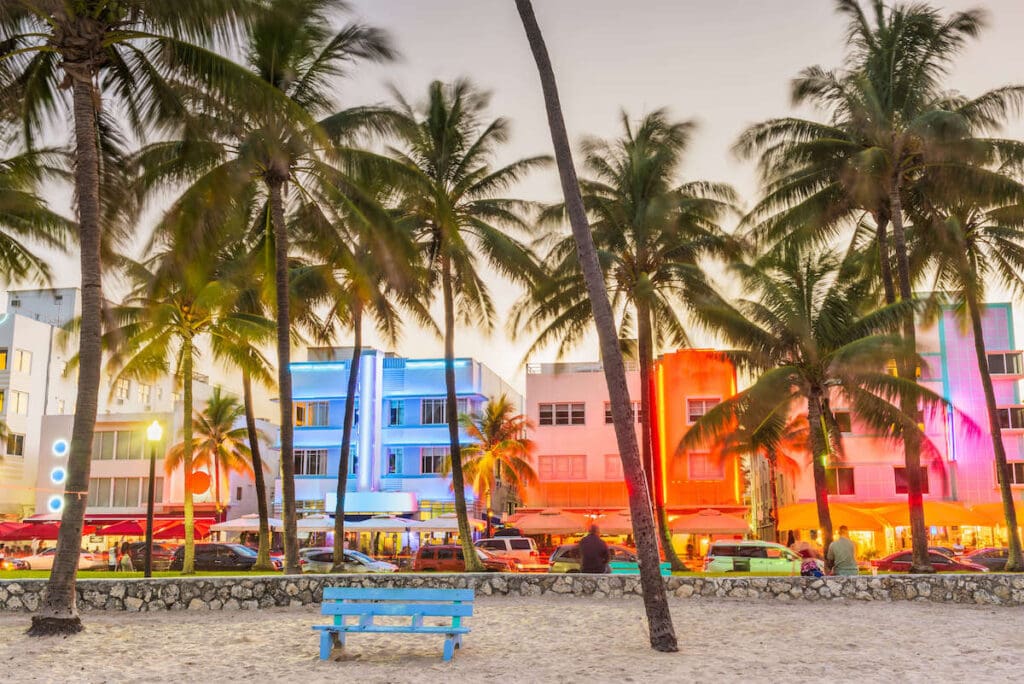
Save this post!
Enter your email & I'll send this post to your inbox! You'll also receive my weekly newsletter full of helpful advice for planning your adventures.
Best time to visit Florida’s National Parks
Florida is a little tricky when it comes to picking the best time to visit. Hurricane season runs from June to November, so during summer and early fall, you can’t necessarily predict the weather. Some years, Florida experiences no hurricanes while other years hurricane warnings seem to be a weekly occurrence.
The best times to visit south Florida are from mid-December to mid-April but unfortunately, this is also known as “high season” and hotel room rates can double and the National Parks can be very crowded.
If you’re looking for great rates, fewer crowds, and can bear heat and humidity then visiting between May and August is smart.
7 Day Florida National Parks Itinerary
Florida’s three National Parks can easily be visited in one week with time to explore a few additional cities and sights. Below is a sample one-week Florida National Parks road trip itinerary.
Depending on your time constraints and interests, you could modify this itinerary to fit into 3-4 days if you only wanted to explore the National parks. You could also easily expand it to 2-3 weeks if you wanted to spend more time camping in the parks or exploring faster afield.
- DAY 1: Explore Miami
- DAY 2: Everglades National Park northern visitor centers
- DAY 3: Everglades National Park southern visitor centers
- DAY 4: Key Biscayne National Park
- DAY 5: Explore the Keys and reach the crown jewel of the Keys, Key West
- DAY 6: Visit Dry Tortugas National Park
Day 1: Explore Miami
“Welcome to Miami!” Trust me you’ll be singing Will Smith for at least your first few hours in the city. Miami is a sprawling metropolis with lots to see and do. If you’re looking to experience some of Miami’s culture, I recommend these two awesome local spots: Wynwood & Domino Park in Little Havana.
Wynwood, a neighborhood of Miami, is one of the newest “up and coming” areas filled with art galleries, restaurants, breweries, and unique clothing shops. It’s a great place to walk a few blocks and enjoy some culture.
Want even more culture? Little Havana will not disappoint. If you hit the area, make sure to grab a scoop of ice cream at the local ice cream shop, Azucar.
Don’t get trapped in the city, though, the parks are waiting. Let’s head south!
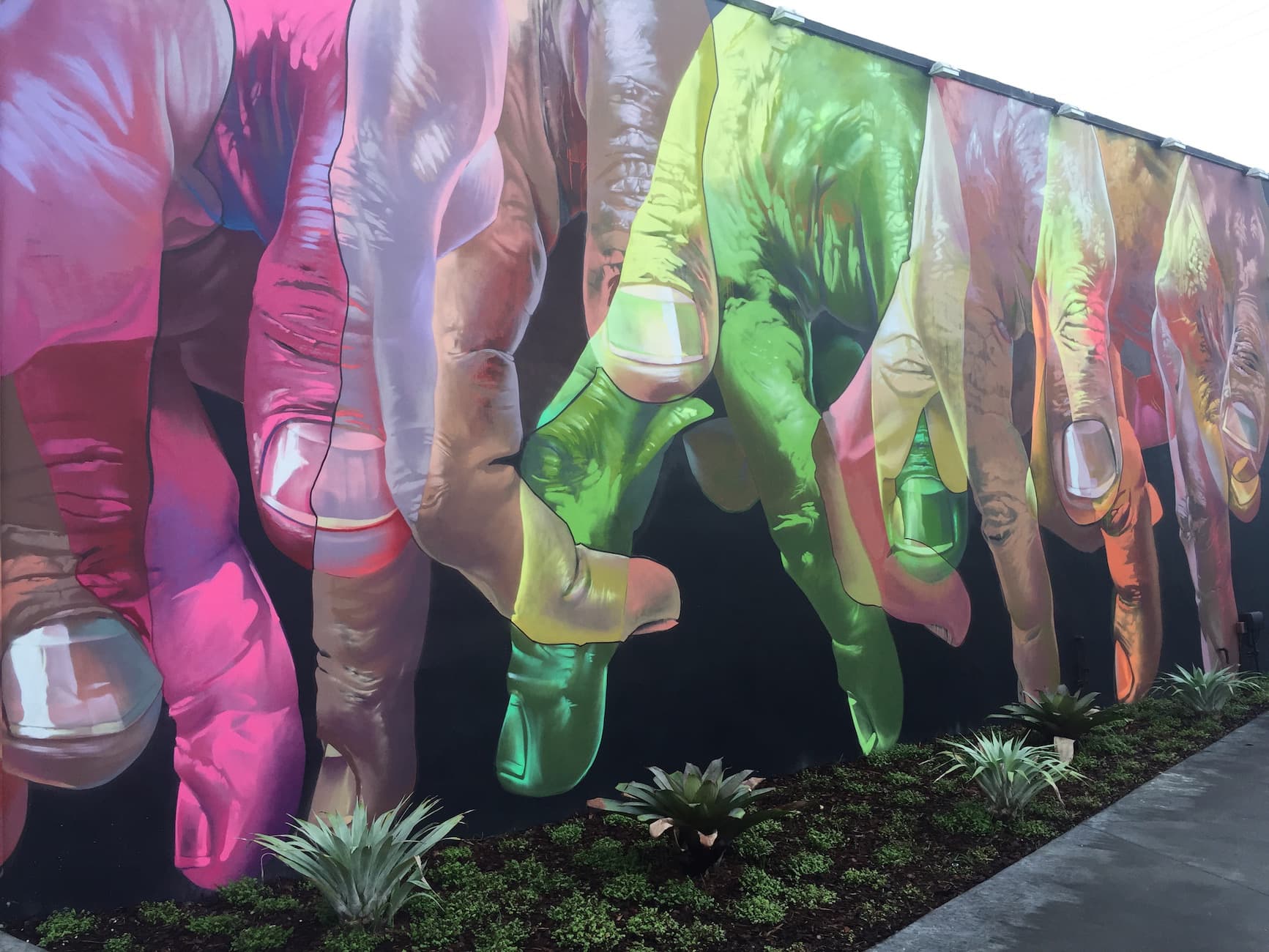
Days 2-3: Everglades National Park
The Everglades are HUGE, covering an area of 1.5-million acres of wetland. The park is so large that it has four visitor centers. During my trip, I insisted on visiting all four of them over two days to see each of their different offerings.
Here’s how we divided our two days in the park into a “northern day” and a “southern day”.
(Keep in mind that while traveling the park roads between the visitor centers you won’t find an overabundance of lodging and food options, so plan ahead and pack snacks to get you from point A to point B.)
Northern Day: Gulf Coast Visitor Center & Shark Valley Visitor Center
The drive from Miami across the park to Everglades City, where the Gulf Coast Visitor Center is located, is 84 miles. I recommend making this drive in one day, stopping at Shark Valley Visitor Center on your way, and then staying near the Gulf Coast for the evening.
Shark Valley Visitor Center is located about an hour’s drive from Miami (depending on city traffic). The guided tram tour gives you a great starting point to learn about the park. This was the only guided activity we went on inside Everglades National Park, but it didn’t disappoint and gave us an opportunity to ask lots of questions.
You can also rent bikes and bike the same 15-mile stretch of road. I definitely recommend getting out of your car and exploring this area by foot, bike, or tram. This is also the only way to access the 65-foot Shark Valley Observation Tower which gives you incredible 360 views of the park!
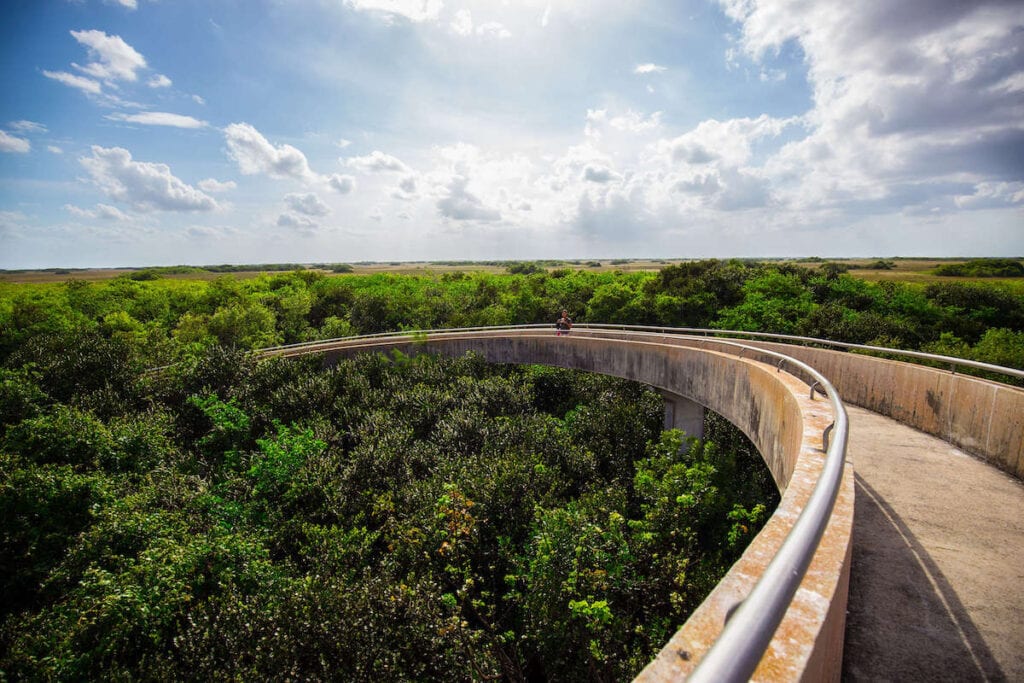
If you are planning to explore the 10,000 Islands protected wilderness of the Everglades, then the Gulf Coast Visitor Center will be your starting off point. It’s a 50-minute drive from Shark Valley Visitor Center to the Gulf Coast Visitor Center. Between the two visitor centers are a few must-stops. I’ve listed them in order from east to west as you travel along US-41 S to the Gulf Coast:
- Airboat Ride: On US-41 traveling from Miami to Naples you will pass numerous airboat operators, only a few of them actually travel on National Parks lands. Many of the locals recommended Cooperstown Airboats. It is important to note that on most of the nearly 2,400 square miles of Everglades National park airboats are prohibited.
- Loop Road Scenic Drive: This road is all about enjoying the journey and not the destination. Trust me, take the time to experience this 24-mile drive that passes through a cypress swamp. Make sure to grab the “Loop Road Scenic Drive” pamphlet at one of the visitor centers.
- Clyde Butcher’s photography gallery: Clyde has been creating photographs of untouched wilderness areas for over 50 years. Be careful where you park, we literally parked and got out of the car to find a gator less than 20 feet from us!
- Oasis Visitor Center: This is one of the BEST places to view gators. They are everywhere (no exageration) and there is a great boardwalk around the lagoon to view them lounging around.
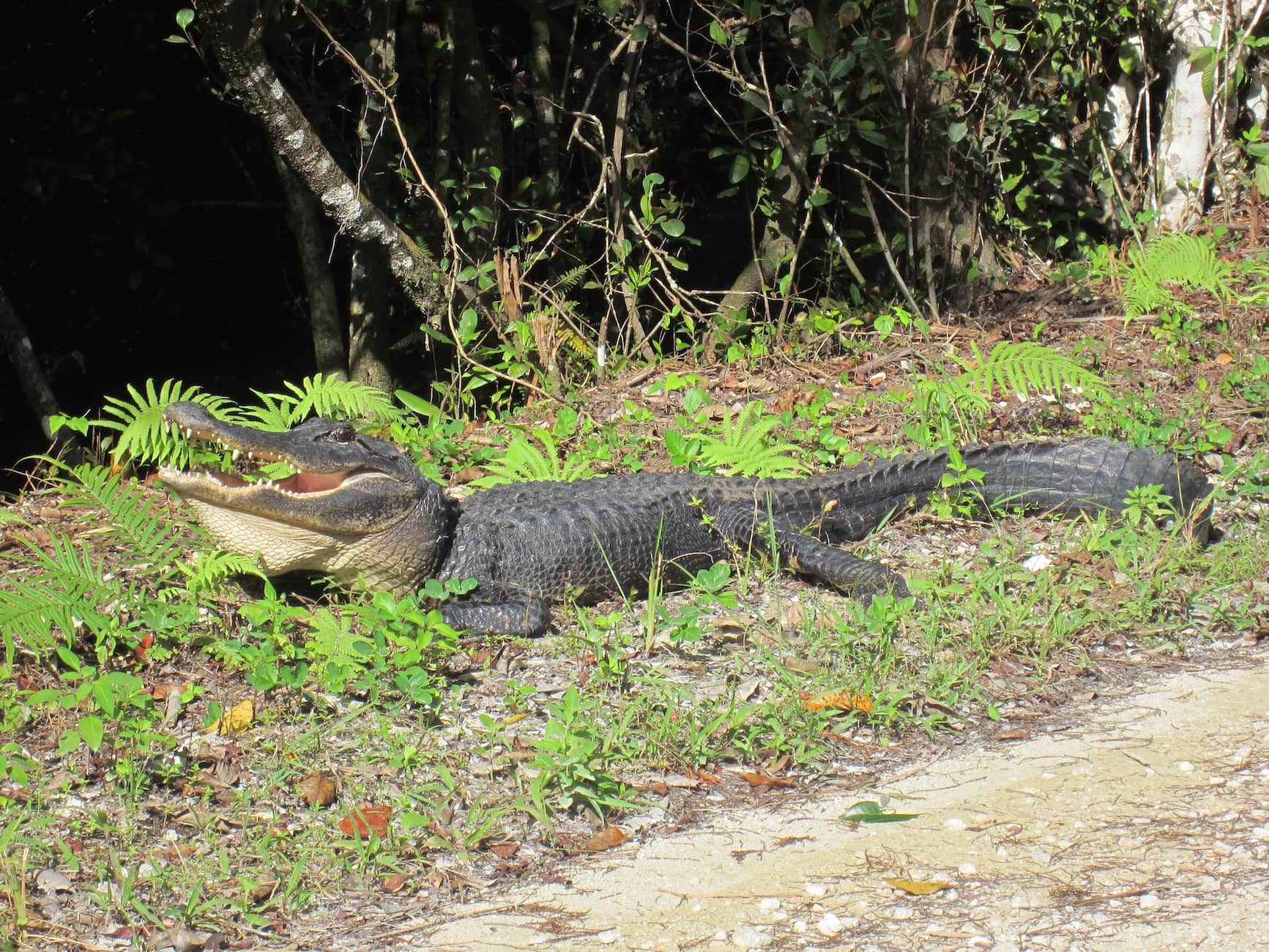
Once you arrive at the Gulf Coast Visitor Center, you can book a boat tour from Everglades National Park Boat Tours, an authorized concessionaire of the National Park Service, to explore the 10,000 Islands area.
From the Gulf Coast Visitor Center on the far western edge of the park, you have to drive back east to access the southern portions of the park by car.
Where to stay in the Everglades – North
Looking for lodging before making the drive all the way back to the Miami area and then south to the southern portions of the Everglades? Chokoloskee is a bridge-accessed island located off the Gulf Coast that is nestled in the 10,000 Islands and Everglades National Park and boasts numerous housing options. Chokoloskee also offers camping & food options.
Southern Day: Ernest Coe Visitor Center & Flamingo Visitor Center
You might think that after one day in the Everglades, you’ve seen enough alligators for one vacation but you most likely haven’t seen a manatee yet nor a crocodile! The southern section of the Everglades, where freshwater and saltwater meet one another, is definitely worth a stop.
Driving west and then south from the northern Everglades, Ernest Coe Visitor Center will be your first stop. Here you can find educational displays as well as a few short hikes.
If seeing a manatee is a must for you then the Flamingo Visitor Center is right where you should head. Flamingo is the southernmost point in mainland Florida and many boat tours also start from this visitor center. You can also rent canoes, kayaks, and bicycles through the Everglades Guest Services.
This is also the only place in the park you can enjoy fresh water and saltwater sport fishing.
From the Ernest Coe Visitor Center to Flamingo I highly recommend stopping to walk the one-mile Anhinga Trail, the half-mile Gumbo Limbo Trail, and the half-mile Mahogany Hammock Trail.
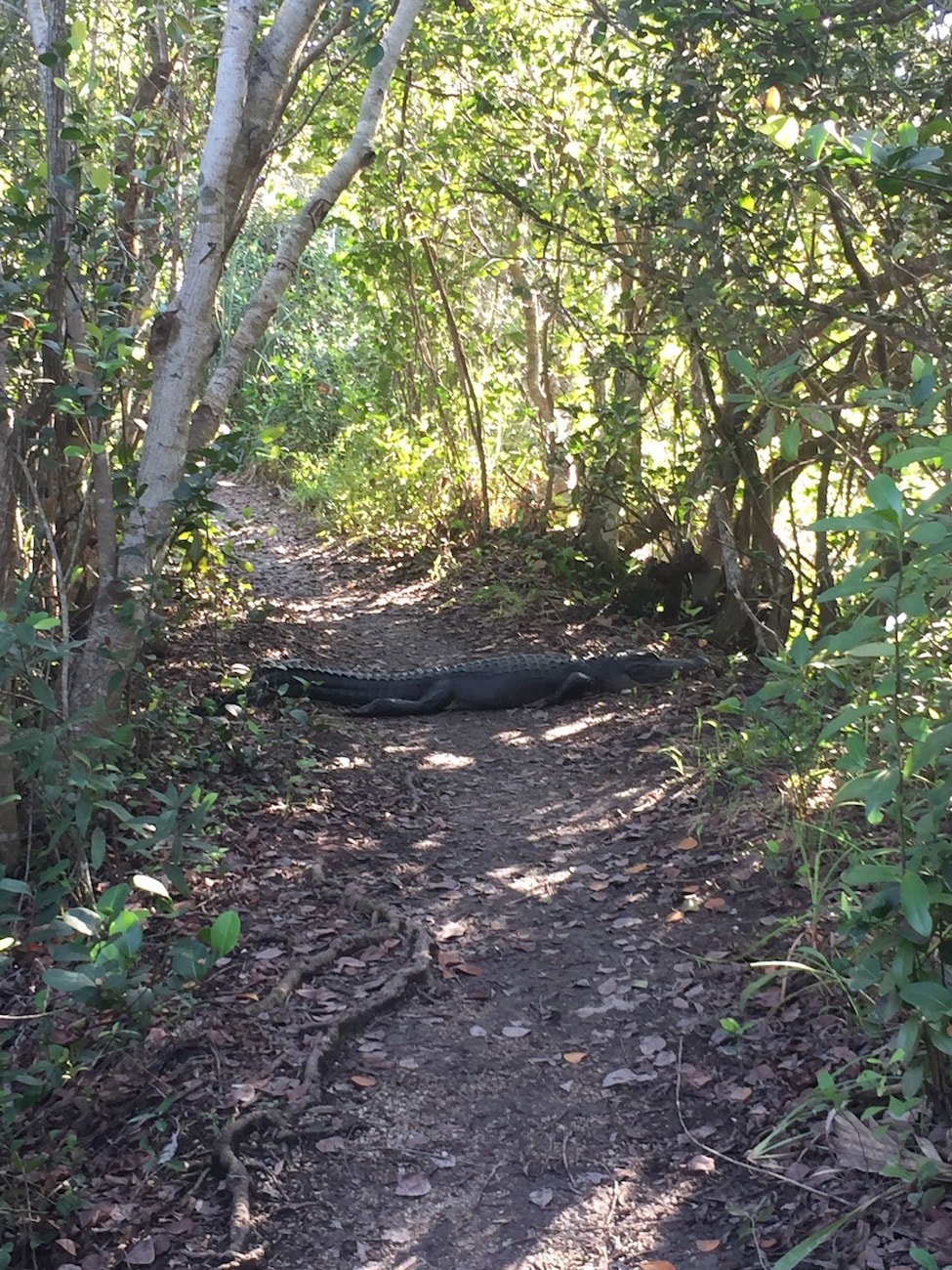
Where to stay in the Everglades – South
Homestead, FL, just an hour south of Miami, is a great place to base yourself to explore the southern areas of the Everglades. There are two rival fruit stands here, Robert is Here and Knaus Berry Farm, and both are definitely worth a visit. Knaus has absolutely incredible cinnamon rolls that are an absolute must. The line for the cinnamon rolls on the weekends goes down the road, so make sure to go on a weekday or get there early.
Another great local dish to try is mofongo, a Puerto Rican plantain dish. Chefs on the Run makes some of the best in the area. Another advantage of basing yourself in Homestead is that it offers lodging options that are significantly cheaper than Miami, FL. If you’re a little “laid back” and looking to save, I highly recommend the Everglades Hostel.
Day 4: Key Biscayne National Park
Outside of Alaska’s northern parks and the American Samoas, I would argue that Key Biscayne is one of the hardest National Parks to visit and experience. 95% of the park is water and when I visited in December, there were no park concessionaires so accessing the water or islands required a private boat.
We spent some time exploring the Dante Fascell Visitor Center, catching a video introduction to the park, and walking the short boardwalk that starts from the center. The Key Biscayne National Park website offers several ways for getting on and in the water including snorkeling trips, kiteboarding, sailing, and more. For tour options, check out the National Park website.
By the way, did I mention that Key Biscayne National Park boasts one of the largest coral reefs in the world? I had no idea the US could make that claim! I will definitely be back to Key Biscayne in the future and hope to camp on either Boca Chita Key or Elliot Key, which both offer first-come, first-serve camping and are only accessible by private boat.
Where to stay near Key Biscayne National Park
Homestead, FL is a great place to base yourself for Key Biscayne’s Visitor center and for quicker access to the Everglades southernmost visitor centers.
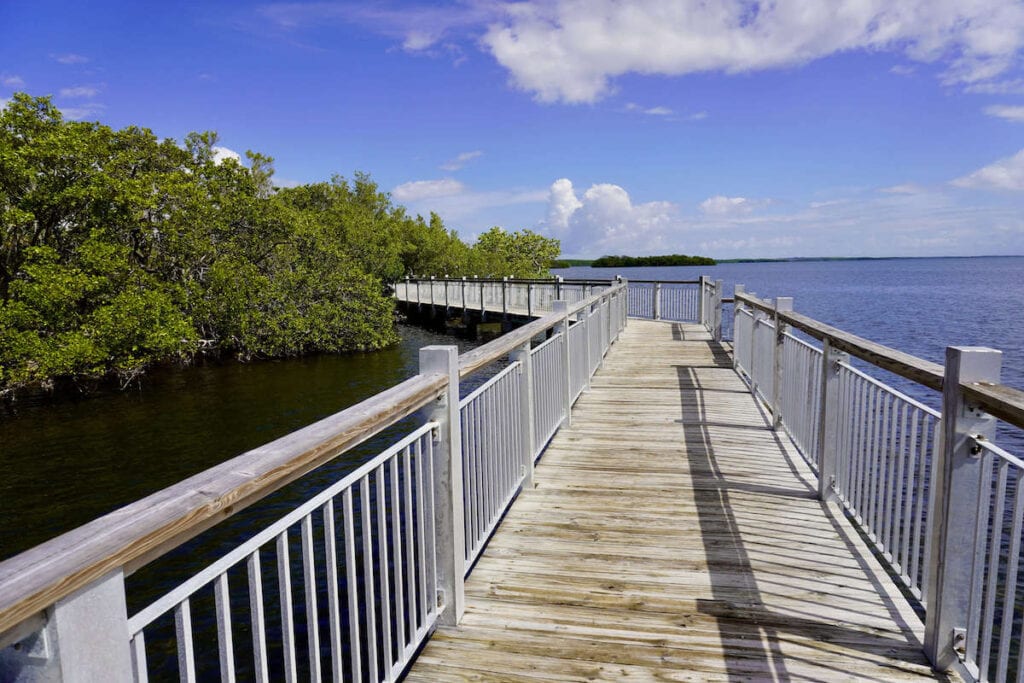
Day 5: Florida Keys
The Florida Keys are a string of islands that stretch about 120 miles south of the southern tip of Florida. The main islands of the Florida Keys include Key Largo, Islamorada, Marathon, Big Pine Key, Lower Keys, and the crown jewel–Key West. There is a lot to see and do in the Keys and these are my top recommendations as you cruise south.
Islamorada
- Florida Keys Brewing Company is an awesome local hang-out with great beer and mellow vibes.
- Islamorada Beer Company is right on the Overseas Highway. Check them out as well for a little tasting in the afternoon!
Marathon
- The Turtle Hospital is a non-profit organization dedicated to the rehabilitation of endangered sea turtles. They offer daily tours from 9am-4pm and reservations are highly recommended.
- 7 mile bridge is coming up after Marathon, so get excited for water vistas out both windows!
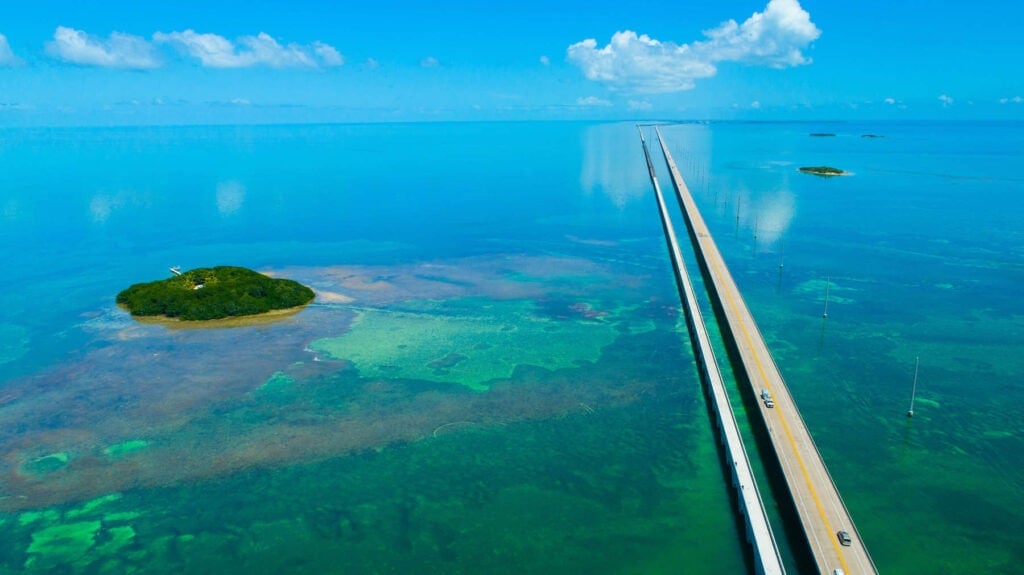
Big Pine Key
- No Name Pub. This is a fun place to stop for some food or snacks as you travel down the Florida Keys. I wasn’t a big fan of the food but honestly every local will recommend this dive bar/restaurant.
- Visit the white sand beaches on Bahia Honda State Park.
Key West
- Coming into outer Key West don’t miss Baby’s Coffee. They are super funky and have a cute little market with awesome finds for beach picnics and roadtrips. It’s definitely worth the stop for a caffeine pick-me-up and more!
- Ernest Hemingway House. You’ve heard of the famous 6 toed cats, right? It isn’t a joke! They are real and EVERYWHERE! A tour of the house is included in the price of admission, so don’t miss out on the most visited house in Florida.
- Take a class with Yoga on the Beach while looking out towards curling ocean waves with ocean breezes all around. It’s definitely a must on the list for any yogis!
- Visit the Truman Little White House. Just taking a walk through this gated community is a must-do.
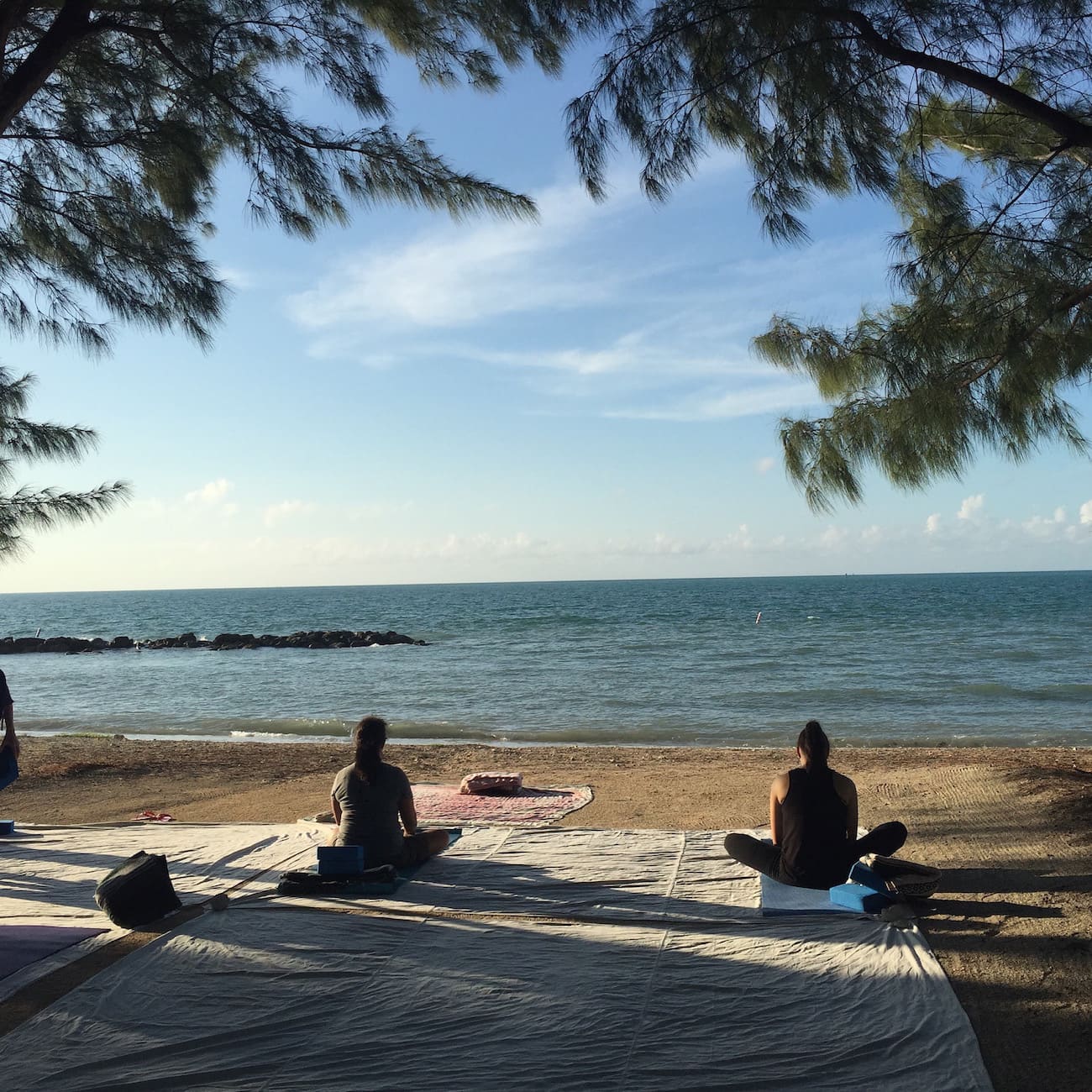
Day 6: Dry Tortugas National Park
While in Key West, it is definitely a “tourist must-stop” to snap a photo at the zero mile marker of US-1 which marks the southernmost point in the continental US. What most people don’t realize, though, is that you can actually travel even farther south and still be on US soil!
Dry Tortugas is the southernmost National Park in the parks system and it is on my top 5 list for US National Parks. It lies 70 miles west of Key West and can only be reached by ferry, private boat, charter boat, or seaplane. Dry Tortugas is a few things: it is a collection of seven keys, home to a 19th-century fort, rich in history and abundant sea life, and absolutely stunning with crystal clear waters on all sides.
You might have thought Key Biscayne was all water, well less than 1% of Dry Tortugas National Park is on dry ground. But trust me, you don’t want to miss Fort Jefferson. Plus, Dry Tortugas offers some of the most interesting ranger-guided talks and tours I’ve ever had in a National Park. The island moat and Fort Jefferson guided walks are equally impressive.
My biggest regret during my week in Florida was not camping at Dry Tortugas. I highly recommend considering camping at Garden Key so you can explore longer.
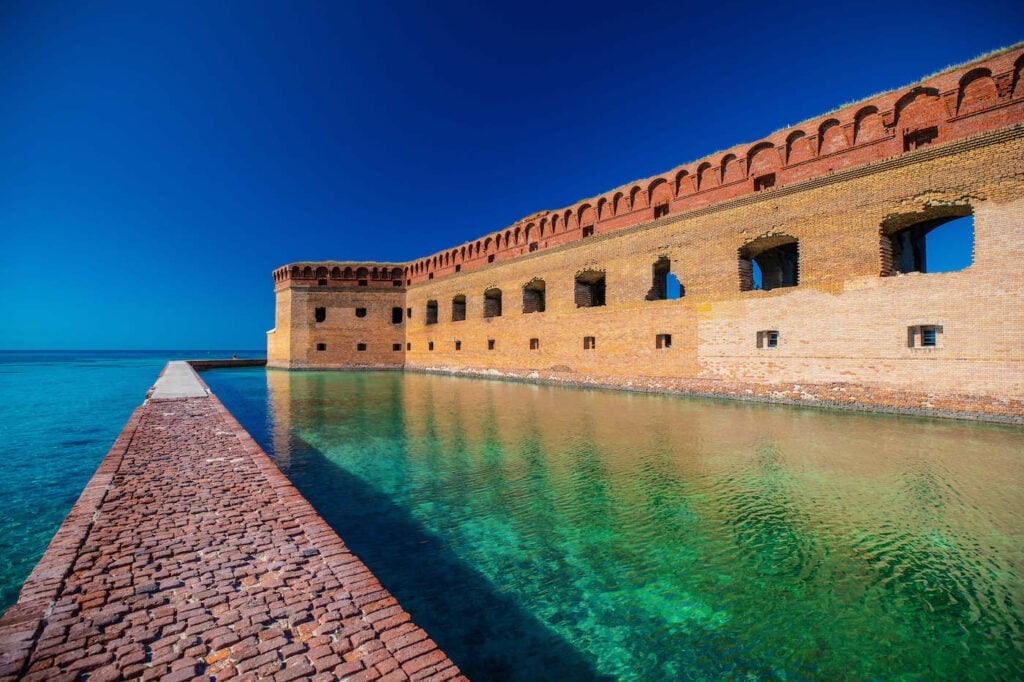
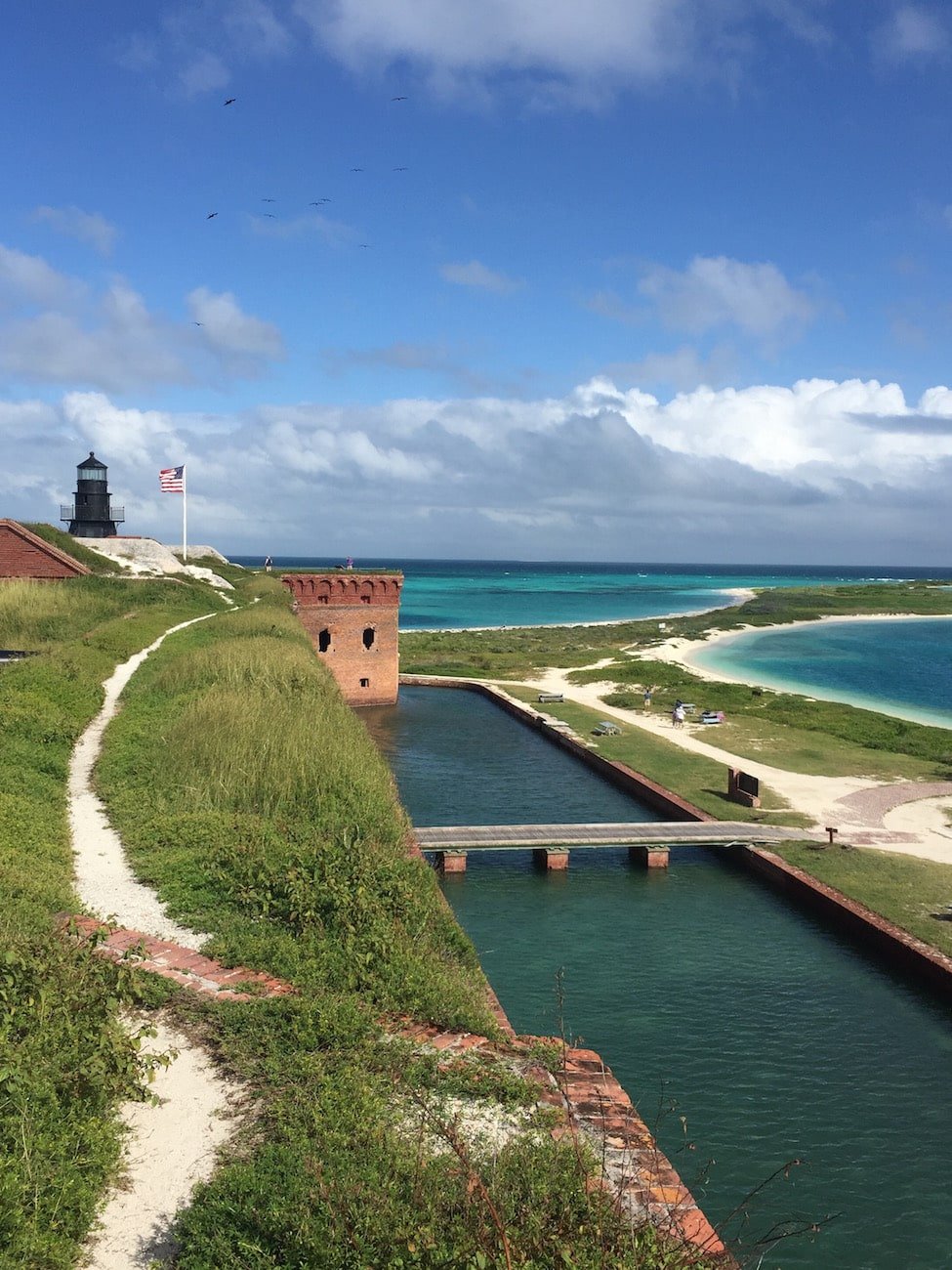
Are you planning a Florida National Parks road trip? Do you have any questions or suggestions for this Florida National Parks itinerary? Leave a comment below!

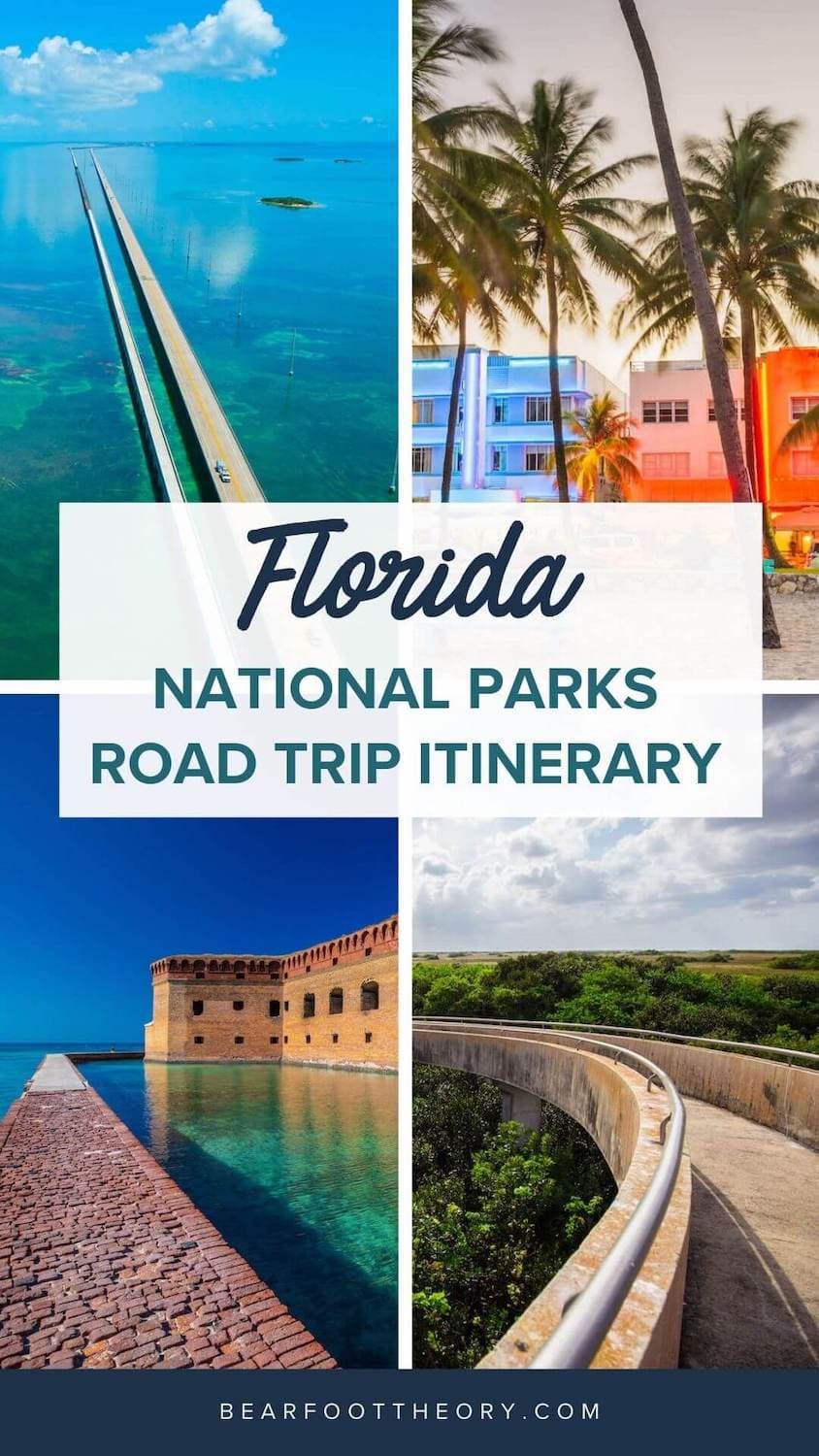
Interested in a trip in December 2017 for up to a week, hitting all of the spots mentioned – Miami, Key Biscayne, Key West, Everglades, and Dry Tortugas.
Hey Walt, that is awesome to hear! We aren’t offering any group trips to Florida at this time but we hope you can utilize the itinerary provided to plan a great trip for yourself. Let us know if you have any questions!
Check us out for rental camping gear in Key West, FL. We’ll outfit you for a Dry Tortugas camping trip- Keys Camping Gear, http://www.kcgearkeywest.com
We moved camp online to https://campingfloridakeys.com . Check us out!
Brilliant read
Have you visited the other Florida national parks? I read there are cabins for easy camping. I am thinking of the park north of Miami, the barrier island off St Pete’s, cedar key in the Panhandle and all the springs north of Orlando. Had booked a family trip visiting the destinations in your post but have had to cancel all accomodation post haurricane Irma. What would they be like in October? Too cold to swim and kayak?
Hi there Jennifer, thanks so much for reaching out to us at Bearfoot Theory! There are only 3 National Parks in Florida–Dry Tortugas, Biscayne & the Everglades. I think you are referring to some State Parks and unfortunately, I haven’t visited them all. I definitely plan to visit again soon.
I would like to get pricing and information for the Florida Parks Itinerary for the first week of April 2018. Thanks for your help, please email me with the information. Mike Pittman
Hi Mike! Thanks for your message. This is just a sample itinerary with our recommendations. We are not a tour company.
Kim, thanks for the great information on these Florida national parks! Dry Tortugas is the farthest south of any national park in the continental US but it is NOT the farther south of any national park. National Park of American Samoa is south of the equator, and the two parks in Hawaii (Hawaii Volcanoes and Haleakala) are both farther south than Florida, too!
Hi there! Thanks for the correction, we will make that update! Yes, you are correct, I meant within the continental United States.
Thank you for all the useful info! I’ll definitely be checking out some of the spots you recommended in this article. I also wanted to point out that you mentioned Dry Tortugas as the southern most park in the U.S. correct me if I’m wrong but Haleakala on Maui and Volcanoes National Park on Big Island are further South. So is American Samoa but I’m not sure if you’re including territories! I was also wondering if you could recommend a snorkeling tour in Biscayne? Thanks a lot!
Thanks for highlighting the parks in Florida. Florida has beautiful national and state parks. Unfortunately, our beautiful natural springs are often overshadowed by the beaches.
Il looks so gorgeous! I love National Patks – except for all those crazy drivers. Your photos are fantastic!!
Thanks, Mikki!
Thank you! Super helpful!
You’re welcome! Thanks for reading!
Hi. Thank you for the helpful information. This might seem like a silly question, but is it actually safe to explore these parks on your own? Our family loves visiting the national parks but this has been my biggest concern with Florida. Any detailed insights on this would be most helpful. Thank you.
Hi Richelle, with all National Parks, it’s important to follow all posted signage, obey rules, and keep your distance from wildlife to ensure safety. However, we don’t think these National Parks are inherently unsafe and would feel comfortable taking our family there. We have a blog post about how to avoid dangerous animal encounters that may be helpful: https://bearfoottheory.com/wildlife-safety-tips/
I really enjoyed reading this article as we are planning a family trip to the three national parks over 7 days in the spring. Did you have any specific considerations/recommendations for kids in the age group of 5-10?
You mentioned about the private boats, seaplanes, charter boats for Biscayne and Dry Tortugas. Do you have any recommendations for these? What did you use? Can you snorkel on your own in these two parks? Also, is it possible to make Homestead as your base and visit all three national parks?
We are planning a trip for 2025. My question….is there a way at for a family of 4 to get to Dry Tortugas for less than $700-800? I have as shocked when I saw the prices of the ferry. I am hoping there is a more affordable way to visit.
Hi Holly – Unfortunately the writer who wrote this no longer works for me so I can’t comment on current prices. I bet if you call the National Park they will have some suggestions.